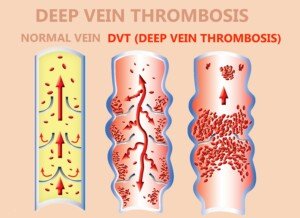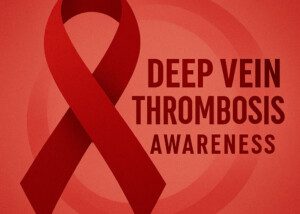
Do you have microscopic colitis and fear getting a deep vein thrombosis (DVT)?
A deep vein thrombosis (blood clot in a deep vein) is a serious situation — because the blood clot in your leg or hip area can break loose and travel to your lungs, which is a major deal.
If this happens, it’s called a pulmonary embolism and can block airflow to your lungs.
This is a medical emergency that can be life-threatening, so it’s important to act fast if you think you have a DVT.
It takes only seconds for the clot substance, once it breaks loose, to reach your lungs.
Symptoms to watch for include swelling, pain, unusual warmth or redness in your leg.
However, the first symptom of a pulmonary embolism (depending on its size and precise location) could be the inability to inhale air, quickly followed by death.
If you have microscopic colitis, you may have wondered if this inflammatory bowel disease might actually raise the risk of developing a DVT.
“Some inflammatory conditions such as inflammatory bowel diseases, specifically Crohn’s disease and ulcerative colitis, are associated with increase in clotting state,” says Matilda N. Hagan, MD, an inflammatory bowel disease specialist at The Center for Inflammatory Bowel and Colorectal Diseases, part of The Melissa L. Posner Institute for Digestive Health and Liver Disease at Mercy Medical Center in Baltimore.
“Therefore, there is an increased risk of DVT,” continues Dr. Hagan.
“Microscopic colitis, although is also due to inflammation of the lining, you can argue is less inflammation than the classic inflammatory bowel diseases; therefore [there is] no clear evidence that it is associated with an increased risk of DVT.”
So even though that’s a popular question, “Can microscopic colitis increase the risk of a deep vein thrombosis?” this is not something you should worry about.
In fact, ask yourself if you have other risk factors for a DVT – some you may not even be aware of that are risk factors.
You may already know that smoking, obesity and extended air travel are risk factors for a deep vein thrombosis.
If you’re an obese smoker who has microscopic colitis, the microscopic colitis does not bump up your risk of developing a blood clot.
But you should definitely lose weight and quit smoking.
Though the risk of a DVT is significantly higher in the few months following a knee or hip replacement surgery, there are other risk factors that can be ongoing, such as excessive sitting throughout the day if you have a desk job.
So rather than worry about microscopic colitis causing a DVT, focus on decreasing your sitting time and commit to a structured exercise regimen.
 Dr. Hagan is dedicated to collaborating with IBD specialists to discuss and explore advanced treatment options for the most complex inflammatory bowel disease cases.
Dr. Hagan is dedicated to collaborating with IBD specialists to discuss and explore advanced treatment options for the most complex inflammatory bowel disease cases.
 Lorra Garrick has been covering medical, fitness and cybersecurity topics for many years, having written thousands of articles for print magazines and websites, including as a ghostwriter. She’s also a former ACE-certified personal trainer.
Lorra Garrick has been covering medical, fitness and cybersecurity topics for many years, having written thousands of articles for print magazines and websites, including as a ghostwriter. She’s also a former ACE-certified personal trainer.
.









































